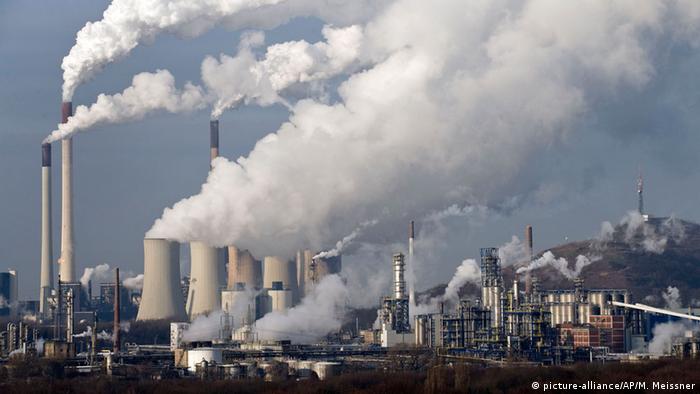Science-Technology
See other Science-Technology Articles
Title: Global CO2 levels hit record high
Source:
Deutsche Welle
URL Source: http://www.dw.de/global-co2-levels-hit-record-high/a-18438858
Published: May 8, 2015
Author: N/A
Post Date: 2015-05-08 09:20:22 by Willie Green
Keywords: None
Views: 3834
Comments: 1
Not only is the global concentration of the greenhouse gas the highest since the beginning of modern records, it's also rising incredibly fast, according to a US government angency. The world has reached a daunting climate milestone: the global concentration of carbon dioxide (CO2), one of the most prevalent greenhouse gases, has surpassed 400 parts per million (ppm). In March 2015, the global monthly average CO2 concentration reached 400.83 ppm, the US National Oceanic and Atmospheric Administration announced. That is the first month in modern records with a global concentration of more than 400 ppm. "It's both disturbing and daunting," said Pieter Tans, chief greenhouse gas scientist at the National Oceanic and Atmospheric Administration, with the increase of CO2 happening at an extremely fast pace compared to changes in CO2 values that occur naturally. The molecule, which is released into the atmosphere through the burning of coal, oil and gas, has reached a level that is 18 percent higher than in 1980. Levels of the greenhouse gas have risen 61 ppm over the last 35 years. In pre-human times, the same increase took nearly 6,000 years. CO2 is one of the chief factors responsible for rising temperatures on earth. Countries have to drastically reduce their CO2 emissions - by switching to renewable energy, for example - to still reach the climate goal of keeping global warming to under two degrees Celsius. An increase higher than two degrees would have severe consequences, experts say. "Our generation is the last one to have the chance to avert the biggest risks that come with climate change, and keep global warming under two degrees," said Christoph Bals, political head of the ecological German NGO Germanwatch. "The fact that CO2 surpassed the 400 ppm level shows that the time for this is running out." The GOP made an attack on NASA’s climate change research on Thursday, voting for a $300 million to $500 million cut to the agency’s Earth science research. The proposal has Democrats up in arms, but the proposal does attempt to protect some parts of the NASA budget from the White House. The House Committee on Science, Space, and Technology voted for the cut on Thursday. The Republican-controlled committee passed the markup along party lines, but the exact figure chopped off from the budget isn’t completely clear. According to Slate, if caps from the 2011 Budget Control Act are removed, the Earth Science division will receive $1.45 billion (down $323 million from the fiscal year 2015 budget of $1.77 billion). If the caps are not removed, the cut goes deeper, shedding about $500 million from the division in charge of climate change studies. In either case, the committee’s proposal falls short of the $1.95 billion requested by President Obama. The Democrats in the committee claim they were left out of the loop, allegedly to prevent a debate on climate change. The committee’s ranking Democrat Eddie Bernice Johnson wrote in an op-ed for the Hill, “Democrats on the committee did not even know existed until late last Friday. Needless to say, there was no bipartisan negotiating. After we saw the bill, we understood why.” The Representative went on describe the many merits of the Earth Science division outside of climate change research. “It’s hard to believe that in order to serve an ideological agenda, the majority is willing to slash the science that helps us have a better understanding of our planet.” The division is responsible for more than just climate change research. According to the Los Angeles Times, after the 2010 Deepwater Horizon explosion, it tracked the oil spilling into the coastal regions from the Gulf of Mexico. It also works to better understand natural hazards like earthquakes and severe storms. The American Geophysical Union pointed out before the vote that aside from climate change research, the division’s research “provide a basis for knowledge and understanding of natural hazards, weather forecasting, air quality, and water availability.” Aside from the cuts pointed at climate science, the House Republicans’ budget isn’t entirely a slash to NASA, but instead gives different priorities than the White House. President Obama requested cuts to NASA’s human exploration program and planetary science divisions, both Republican favorites. The human exploration program includes the Space Launch System (SLS) and the Orion program to design a new spacecraft to take humans into deep space, particularly Mars. The president proposed a cut of about $400 million combined for the two programs, which was rebuffed by the Committee’s markup. Likewise, planetary science, which researches the other planets of the solar system (not including Earth), would have taken a small cut under the president’s recommendations, but will be increased if the committee has its way. More details on the NASA budget squabble and the cuts for Earth science, particularly climate change research, can by found here on SpacePolicyOnline.
Poster Comment: The Fossil Fuel Lobby funds partisan ignorance.

GOP Attacks Earth Science At NASA,
Climate Change Research In Peril
Post Comment Private Reply Ignore Thread
Top • Page Up • Full Thread • Page Down • Bottom/Latest
#1. To: Willie Green (#0)
Oh nos! We izz all gonna DIE!
CO2 levels hit record high...
Top • Page Up • Full Thread • Page Down • Bottom/Latest
[Home] [Headlines] [Latest Articles] [Latest Comments] [Post] [Mail] [Sign-in] [Setup] [Help] [Register]
